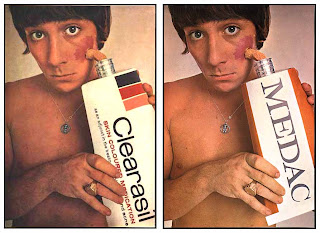
I can't offer much of a debate here, /a, as I quite agree with you. It's strange at first, to hear the songs that you think are "your secret" playing in the background of a commercial (or a video game, or a movie, or a TV show), but ultimately I feel it's better that these ad agencies and corporations funnel money into the coffers of smaller, lesser known, bands. I mean, don't
The Shins need the cash and exposure more than
Jessica Simpson (or didn't they, back in 1989 or whatever)?
That being said, it's certainly important that bands have a say in what products their music is used to promote. When
Le Tigre was asked if
"Hot Topic" could be used in a
Coca-Cola commercial, they declined. Yet the sale of
"Deceptacon" to
Telus did not go against the band's principles. Furthermore, as
Kathleen Hanna explained in
an interview with Exclaim!:
Signing to a major didn’t make us rich by any means.[...]Having bills to pay is a fact of our lives
and sometimes we have to do weird shit to keep the band financially afloat.
Once again, your timing in bringing up the current topic is, er, timely. PF is still a little floored each time he hears
The Fall's "Blindness" in an SUV ad (so I suppose it's good that
their "Touch Sensitive" Corsa ad doesn't air where we live), and thus we are constantly talking about how surprised we are to hear so-and-so's song in a commercial, even though we shouldn't be. The subject came up again last night, as we discussed song placement in soap ads with a friend. When we came home, there was your post, waiting for us like the last word or the minutes of the meeting. As you pointed out, and as it's become clear over recent years, it's our contemporaries who act as music supervisors these days. Some might argue that
Death Cab for Cutie wouldn't be as famous if it weren't for people our age (or thereabouts) programming soundtracks for
The O.C.. Some, like the friend with whom we met yesterday evening (who, incidentally, loves DCFC), don't really want their favourite bands to be so famous, or at least don't want to hear their favourite songs everywhere they go, if only because they don't want to be desensitized to the power that made these songs their favourites in the first place.
I have to admit, I don't mind anymore. Like you, I am less and less opposed to hearing "my songs" in commercial spaces -- if I was ever really opposed at all -- and I now want more people to be aware of the bands I love and support, as it doesn't do them much good to selfishly hoard them. When I turn my television on, would I rather hear
Spoon than
"These bites are made for poppin'"? Absolutely.
(Returning to
Ben Gibbard for a moment: I'm also amused by the inclusion of
The Postal Service's
"Such Great Heights" in a
UPS ad. Take
that,
Other Postal Service!)
I'm no longer concerned about (allegedly) protecting "my bands" by keeping them underground, and I'm no longer concerned about being "in the pocket". At the risk of sounding sanctimonious, I'm now concerned about what goes into these bands' pockets. (Yeah, I know, it's a terrible line.)
I mean,
someone is going to get paid for the music in the commercial, whether it's another band or a
sound-alike, so if your band isn't opposed to the product, take the money and run with it! (Oh, and if you have the time,
why not adapt your lyrics to fit the bill?) If you turn it down, the ad makers could easily use a reasonable facsimile of your music, everyone will think you sold out anyway, and if you're not Tom Waits, you won't
win the lawsuits.
